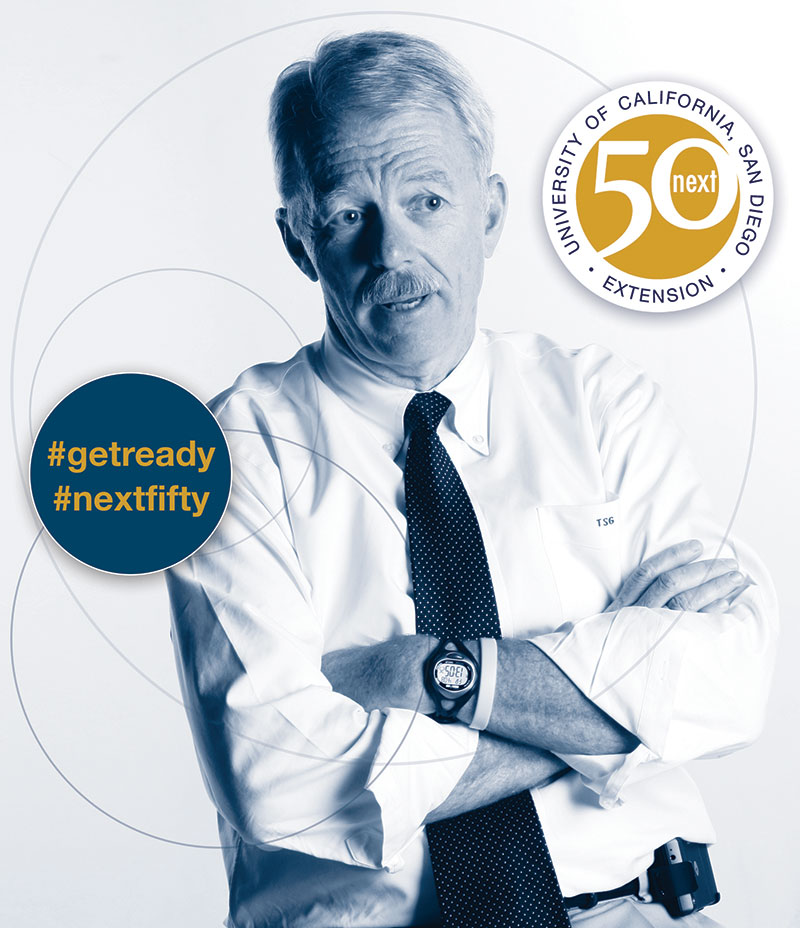23 February 2016
50 Voices of the Future: Tom Gehring reflects on the outlook of healthcare

In honor of UC San Diego Extension's first 50 years, 50 Voices of the Future asks thought leaders about the trends, breakthroughs and social advances they foresee over the next 50 years.
As far as career trajectories go, Tom Gehring’s has been unusual: from Navy officer on a nuclear submarine to high-level consultant to executive director of the San Diego County Medical Society. All of these jobs demanded he spend a lot of time thinking about how complex systems work, and how these systems can be made to work better through leadership. He predicts that DNA research will have an enormous impact on almost every aspect of health care, from the doctor’s office to hospital administration. As a former military man, he’s also a big believer in personal discipline – and he believes the future of health care will depend in part on Americans’ willingness to change their behavior and adopt healthier habits. On that subject, he’s optimistic. “It will not happen overnight,” says Gehring, who retired from the Medical Society at the end of December. “But it will happen. Because people aren’t stupid.”
1) Why is the work you do important?
Sooner or later, everybody becomes a patient. Addressing health care as a systems problem is what I’ve devoted the last 14 years of my life to. I can’t change individual or collective behavior myself, but I’ve worked to create the processes and systems to make that change happen.
(2) What are the influential/exciting developments happening in your field now and why?
Genomics has gotten a huge amount of press, rightly so. Because if we’re able to deal with individual patient’s DNA and repair at the DNA level, then frankly there’s not much we can’t do.
We also have the growth of electronic health, mobile health and telehealth. All of them are extensions of the same thing, which is harnessing the power of the digital revolution to medicine. For example, things like the digital home visit. Is Dr. Marcus Welby going to grab his bag and go to your house? No. Is he going to get on a video conference or an app with you and monitor all of your vitals and look at your last five tests in real time? Absolutely. Will that cause major increases in efficiencies? You betcha.
(3) What’s the next big thing?
From a technology next big thing, it’s clearly genomics. From a procedural perspective, it’s the evolution of getting rid of non-value-added tasks so that the doctors are doing high-value-added work. The role of the physician will morph in ways that take advantage of things they’re really good at. As time moves on, we will realize the gains from focusing on processes and technology that optimizes the doctor’s workday so that they’re not wasting it on non-value-added administrivia – it’s the elimination of nonsense.
(4) How big of an impact will your field play in shaping the future of the San Diego region and beyond?
What you see in Biotech Mesa, all of the biotechnology that’s going to be successful sooner rather than later, that will continue to expand. Being geographically close to that means we will be on the leading edge of taking it from the lab to the patient. That synergy between what happens on Biotech Mesa and what happens in the exam room – we’re very poised to take advantage of that – which means we’ll be on the leading edge of that adoption and implementation, which is very exciting.
(5) Hop into your time machine…what does the future look like for this field in 50 years? How can individuals/companies get prepared for what’s next?
Forty-five percent of Americans have at least one chronic condition and 22 percent of Americans have multiple chronic conditions. Hopefully as many chronic conditions as possible will be ameliorated through gene mechanics. But many chronic conditions are related to behavior – people not being able to push the plate away, for instance. I think the real focus will be on human sustainability – making sure that people avoid doing the self-destructive stuff and do the good stuff.

Learn more about the ideas Tom Gehring discusses in this article in a range of Healthcare courses and programs offered by UC San Diego Extension, including the Healthcare Information Technology, Global Health and Policy certificate programs, and the Masters of Advanced Studies in Clinical Research.
Image of Tom Gehring is courtesy of the San Diego Union-Tribune and Gerald McClard.